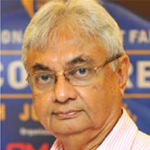
Igor Chapurin
Fashion Designer
Chapurin
"Now we can see the Russian trend in international fashion. And Russian themes inspire a lot of designers in France, Italy and Japan. I as a Russian designer never use our Russian style in a vulgar way."
"Now we can see the Russian trend in international fashion. And Russian themes inspire a lot of designers in France, Italy and Japan. I as a Russian designer never use our Russian style in a vulgar way."
Fibre2Fashion: Your first collection, To Russia with Love was shown in 1995 in Moscow. Since then, what is that one thing consistent in your creations?
Igor Chapurin:
The main feature of
my style is the brands cut. We focus on prêt-a-porter and haute couture
collections. My first job is that of a womanswear constructor. I know the background
of any creation. That is our unique advantage.
F2F: How has the fashion industry changed since 1995, especially in terms of technology and reach? Can you describe its journey through different phases?
IC:
In the 1990s, there was no fashion industry in Russia, though there
were a number of designers. Now, Russian fashion is in the process of maturing and
the number of designers is increasing. We have crossed the phase of hostility
and now, wearing the work of Russian designers is the greatest fashion trend.
As for the Russian market, I would assess its newest trends as highly positive.
Many Russians have turned to local designers. As a consequence, many new
Russian brands have emerged and existing ones grow and gain customers. Compared
to the global fashion industry, the Russian industry is at its initial stages.
Serious investments, professional management and distribution structures are
yet to come.
F2F: What is the status of the Russian fashion industry in the global fashion business?
IC:
Several years ago,
the conditions which the Russian fashion market was facing forced us to look
for another place to show our season’s collections. We chose Paris and we are
quite satisfied with the progress and development of the brand both in Russia
and internationally. The number of media representatives and buyers has been
growing. Over the years, the collection that we show in Paris, and the fashion
market in this country, have developed immensely. New names emerge, existing
ones expand and I see a bright future for the fashion industry in my country.
Talking about fashion weeks, Russian designers are still less popular but I am
sure that they will find their own niche soon!
F2F: What fashion or textile requirements is Russia dependent on other countries for?
IC:
Russia is one of the largest fashion markets. It is a competitive market. Unfortunately, we are still a consumer but not a producer for the rest of the world. I think we should start creating fabric designs. We are still dependent on footwear and accessories from abroad. Most Russian fashion brands do not use Russian fabrics. We do not have many producers of high quality material. That is why we have to buy fabrics from Italy, France, the United States of America, Spain and even Japan.
F2F: What do you think about green fashion and sustainability? How much does your brand focus on these?
IC:
Russian fashion is
too young to focus on the idea of green fashion. We support some non-radical
green organisations like World Wide Fund for Nature (WWF). But the point of
green production is our future. I support some green events in Moscow but only
if they are not extreme. We use ecologically viable fabrics and all our
production is ECO standardised.
F2F: Do you think Russian fashion is inspired by other cultures? Has Russian fashion inspired designers from other countries?
IC:
The Russian trend in
international fashion is evident. Russian themes inspire a lot of designers in
France, Italy and Japan. As a Russian designer, I never use our Russian style
in a vulgar way. I was inspired not by matreshka and perestroika but Russian
ballet, literature, music and art. That is why you find topics like Kandinskiy,
Nabokov, Tolstoi and Bolshoi theatre in my creations.
F2F: What is your opinion about designing plus size clothing? Do you think there is a good market in this segment?
IC:
I think that it is an interesting niche. We produce plus size
clothing, but our show collection for catwalks is based on more classical
fashion sizes.
F2F: What inspired you to expand your business to furniture, interiors and exterior designing. How does this impact your label?
IC:
Now, we create lifestyle products. That is why furniture was a logical step in developing our brand. While creating the line Chapurincasa, I was inspired by the interiors of Americal skyscrapers of the early 20th century. We use a lot of leather and wood from Mozambique.
F2F: What is your latest creation?
IC:
My last collection was called Diva. I was inspired by Hollywood divas like Jane Russell. That is why we use a lot of mini, sharp silhouettes and black and beige.
F2F: What kind of home furnishing fabrics are in trend in Russia? Which is your personal favourite?
IC:
Russians traditionally like organic fabric. They do not appreciate artificial material. My favourite fabric is suede. I have a lot of furniture in my house made with this beautiful and very physiological fabric.
F2F: What is your advice to aspiring designers?
IC:
To be a designer means to be a workaholic. You should be the biggest fan of your profession and believe in results. It is very important to be with the right people. A team creates a king.
Fanny Vermandel
Gabi Seligsohn
Aseem Prakash
Abhay Gupta
Pradip Mehta
Rahul Mehta
Rahul Mehta
Anurag Batra
Bill D’Arienzo
Arun Sirdeshmukh


20230103183907.png)






_8.JPG)



